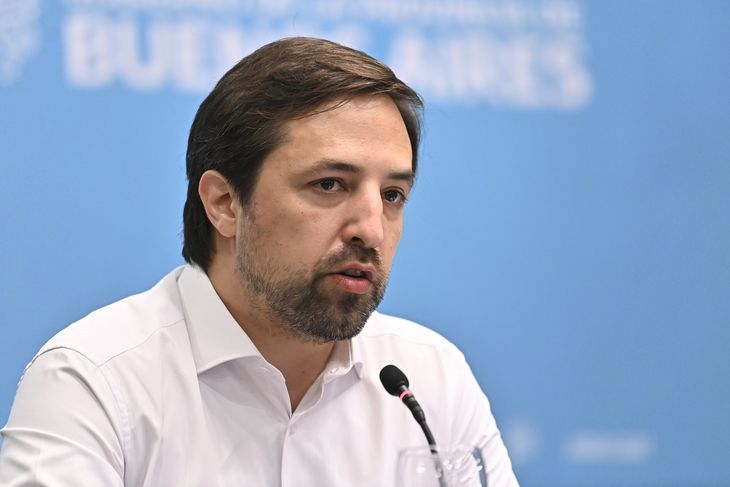The Chamber of Deputies of the province of Buenos Aires could give the green light next week to the creation of the Buenos Aires Pharmaceutical Industry Centera public limited company with majority state participation that is promoted by Governor Axel Kicillof with the aim of guaranteeing equitable access to medicines for the population.
Yesterday, the initiative obtained a favorable clearance from the General Legislation, Health and Budget committees of the lower house and it is estimated that it will be brought to the floor in the session on Thursday, December 5 or 12.
The proposal, which the Executive Branch sent last December to the Legislature and which the Minister of Health, Nicolás Kreplak, defended before the deputies and senators in committees, states that “Access to medicines should not be hindered by economic interests, nor can it be subject to the individual’s ability to pay the price set by the market”.
Kreplak in committees of the Legislature.jpeg
Minister Kreplak defended the initiative in committees before legislators from all political blocs
Press Union for the Homeland Buenos Aires Chamber of Deputies
Thus, it determines that “public production allows limiting commercial rules that prioritize increasing profitability in the private production of medicines, and places the focus on the health needs of the population.”
As Kreplak stated at a press conference last Monday, the price deregulation promoted by Javier Milei’s government had a considerable impact on the pharmaceutical market. “Drug prices increased between September 2023 and 2024 by 330 percent, despite the fact that inflation in that period was 209 percent,” he said.
In this framework, he demanded that the Nation “take the necessary measures so that medicines, not only outpatient medicines, but especially the high-cost ones purchased by social works and the Ministry of Health of the Province, drop in price” and explained that “with that objective, we present the bill for the public medicine company of the Province.”
“We seek to produce or associate with the pharmaceutical industry to reduce the price of medicines, be able to buy more quantities at a lower price and meet the needs of the entire population”he highlighted.
To approve the proposal, Unión por la Patria, which has 37 of 92 seats, needs a simple majority since the project has a favorable clearance of commissions. It is expected that Peronism will have the support of the Unión Renovación y Fe (dialogue libertarians) and the Civic Agreement-UCR-GEN blocs because, if sanctioned, the creation of a public medicines company would represent significant savings for hospitals. municipal, which would benefit the mayors of the space.
Meanwhile, from La Libertad Avanza, the PRO and UCR Cambio Federal have already expressed their rejection of the norm, considering that they will not endorse projects that expand the state structure in health or public spending.
What does the project propose?
The proposal establishes that the Center, which will depend on the Ministry of Health, will have the objective of “carrying out research, development, production, manufacturing, fractioning, transformation, completion, import and/or export, purchase , wholesale and/or retail sales and distribution as well as quality control of all types of medicines, vaccines, supplies, medical products, equipment, active pharmaceutical ingredients, primary and secondary standards for production quality control, supplies dental doctors, products sanitary and any other input necessary for health.”
In addition, it must be in charge of “physicochemical and microbiological quality control of food and water, the exploitation of invention patents, licenses, formulas and national or foreign brands, representation, mandate, commission and consignment activities, import and export, as well as any other activity aimed at strengthening the technological, scientific, productive, and innovation development of society itself, as well as the public and private sector of the province of Buenos Aires.”
Nicholas Kreplak.JPG

Buenos Aires Government Press
In the foundations of PE 1/24-25 it stands out: “Produce medicines and medical products from a Public Limited Company with Majority State Participation, should help avoid the price premiums applied by private laboratories when they have a production monopoly or a distinctive brand, which in turn translates into lower prices for end users throughout the market.” and it is added that “the public production of medicines becomes an effective tool to guarantee the right to health and guarantee that no citizen is deprived of treatments for economic reasons.”
Health emergency company
Meanwhile, another health regulation sent by Kicillof still needs to be discussed in the Senate: the one that creates a provincial medical emergency care company and which was approved last July in the Deputies.
This involves the creation of a public limited company with majority state participation (with at least 51% of shares in the hands of the provincial administration, although this percentage could increase in case of lack of interest from the private sector), to constitute the Buenos Aires Health Emergencies Company.
Its main objective will be to strengthen interjurisdictional coordination of medical emergency care and complement the Emergency Medical Care Service (SAME) currently provided by municipalities.
The company aims to guarantee pre-hospital and inter-hospital logistics and transportation, the logistics and transportation of critical supplies of the health system (blood and blood products, oxygen, medications and others), as well as pathogenic waste from health centers.
Source: Ambito




